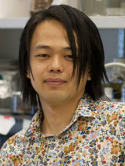Multilayered mechanisms ensure that short chromosomes recombine in meiosis Journal Article
| Authors: | Murakami, H.; Lam, I.; Huang, P. C.; Song, J.; van Overbeek, M.; Keeney, S. |
| Article Title: | Multilayered mechanisms ensure that short chromosomes recombine in meiosis |
| Abstract: | In most species, homologous chromosomes must recombine in order to segregate accurately during meiosis1. Because small chromosomes would be at risk of missegregation if recombination were randomly distributed, the double-strand breaks (DSBs) that initiate recombination are not located arbitrarily2. How the nonrandomness of DSB distributions is controlled is not understood, although several pathways are known to regulate the timing, location and number of DSBs. Meiotic DSBs are generated by Spo11 and accessory DSB proteins, including Rec114 and Mer2, which assemble on chromosomes3–7 and are nearly universal in eukaryotes8–11. Here we demonstrate how Saccharomyces cerevisiae integrates multiple temporally distinct pathways to regulate the binding of Rec114 and Mer2 to chromosomes, thereby controlling the duration of a DSB-competent state. The engagement of homologous chromosomes with each other regulates the dissociation of Rec114 and Mer2 later in prophase I, whereas the timing of replication and the proximity to centromeres or telomeres influence the accumulation of Rec114 and Mer2 early in prophase I. Another early mechanism enhances the binding of Rec114 and Mer2 specifically on the shortest chromosomes, and is subject to selection pressure to maintain the hyperrecombinogenic properties of these chromosomes. Thus, the karyotype of an organism and its risk of meiotic missegregation influence the shape and evolution of its recombination landscape. Our results provide a cohesive view of a multifaceted and evolutionarily constrained system that allocates DSBs to all pairs of homologous chromosomes. © 2020, The Author(s), under exclusive licence to Springer Nature Limited. |
| Keywords: | unclassified drug; nonhuman; polymerase chain reaction; chromosome; meiosis; gene expression; protein assembly; protein; protein binding; double stranded dna; genetic recombination; saccharomyces cerevisiae; chromatin immunoprecipitation; double stranded dna break; binding protein; yeast; karyotype; genetic conservation; chromosome segregation; spo11 protein; prophase; recombination; saccharomyces; mer2 protein; priority journal; article; rec114 protein; saccharomyces mikatae |
| Journal Title: | Nature |
| Volume: | 582 |
| Issue: | 7810 |
| ISSN: | 0028-0836 |
| Publisher: | Nature Publishing Group |
| Date Published: | 2020-06-04 |
| Start Page: | 124 |
| End Page: | 128 |
| Language: | English |
| DOI: | 10.1038/s41586-020-2248-2 |
| PUBMED: | 32494071 |
| PROVIDER: | scopus |
| PMCID: | PMC7298877 |
| DOI/URL: | |
| Notes: | Article -- Export Date: 1 July 2020 -- Source: Scopus |
Altmetric
Citation Impact
BMJ Impact Analytics
Related MSK Work









